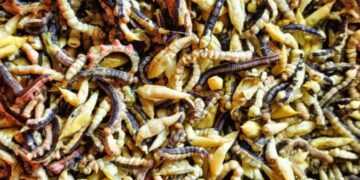Em um ato de desespero e retribuição, uma vendedora ambulante haitiana recentemente se tornou o centro de um evento chocante na comuna de Kenscoff, Porto Príncipe. Movida pela perda de familiares para a violência de gangues, ela teria envenenado fatalmente cerca de 40 membros de um notório grupo criminoso, utilizando suas conhecidas empanadas, ou “pâtés”, como veículo para a vingança. O caso lança luz sobre a crua realidade do Haiti, um país assolado pela brutalidade de gangues e onde cidadãos comuns, por vezes, recorrem a medidas extremas.
O Domínio do Terror e a Tragédia Pessoal
O Haiti, especialmente sua capital, Porto Príncipe, tem sido palco de uma escalada de violência perpetrada por gangues armadas que disputam territórios e aterrorizam a população. Entre elas, destaca-se a “Viv Ansanm” (que significa “Viver Juntos”, em crioulo haitiano), uma poderosa aliança de gangues supostamente ligada ao ex-policial e agora chefe do crime Jimmy “Barbecue” Cherizier. Este grupo tem um longo histórico de controle sobre áreas como Kenscoff, impondo sua lei através de roubos, sequestros e assassinatos.
Foi nesse contexto de medo e impunidade que a vendedora, uma figura respeitada na comunidade por seus salgados, viu vários de seus familiares serem vitimados pelas ações da gangue. A dor e a impotência diante dessas perdas parecem ter sido o estopim para seu plano arriscado.
A Refeição Fatal e a Morte Rápida
Conhecida pelos membros da gangue, que frequentemente consumiam seus produtos, a mulher não levantou suspeitas ao oferecer-lhes dezenas de empanadas gratuitamente. Como pretexto, ela teria agradecido aos criminosos por “protegerem o bairro”. Contudo, os salgados estavam adulterados com um potente inseticida industrial, identificado em alguns relatos como “óleo de chenille”, um pesticida agrícola usado para eliminar lagartas.
Minutos após consumirem as empanadas envenenadas, os membros da gangue começaram a apresentar sintomas severos: fortes dores abdominais, vômitos e convulsões violentas. Apesar das tentativas de buscar socorro ou fugir, todos os cerca de 40 indivíduos morreram antes mesmo de conseguirem qualquer tipo de assistência médica.
Fuga, Confissão e um Futuro Incerto
Consciente das represálias iminentes, a vendedora deixou sua casa em Kenscoff antes que a notícia do envenenamento em massa se espalhasse. Sua precaução provou-se acertada, pois, pouco tempo depois, sua residência foi invadida, completamente destruída e incendiada por outros membros da gangue em retaliação.
Buscando segurança, a mulher se entregou voluntariamente a uma delegacia de polícia. Em sua confissão, admitiu a autoria do envenenamento dos 40 membros da gangue, afirmando que o fez como vingança pelas mortes em sua família e que agiu sozinha, sem cúmplices. Ela também solicitou proteção pessoal às autoridades.
Até o momento, o governo haitiano não emitiu uma declaração oficial sobre o caso, e não há informações claras se a mulher enfrentará acusações formais pelas mortes. Enquanto isso, ela permanece sob proteção policial, e sua história se tornou um sombrio reflexo da crise de segurança e da busca por justiça – por quaisquer meios – em um país onde o Estado muitas vezes falha em proteger seus cidadãos. Segundo dados recentes da ONU, a violência relacionada a gangues resultou em milhares de mortes no Haiti apenas no último ano, evidenciando a gravidade da situação que levou a este ato extremo de vingança.
A Taste of Vengeance: Fatal Empanadas Take Down Gang Members
Driven by the loss of family members to gang violence, a Haitian street vendor used her empanadas to fatally poison dozens of criminals, later turning herself in to the police seeking protection.
In an act of desperation and retribution, a Haitian street vendor recently became the center of a shocking event in the Kenscoff commune of Port-au-Prince. Driven by the loss of family members to gang violence, she reportedly fatally poisoned about 40 members of a notorious criminal group, using her well-known empanadas, or “pâtés,” as the vehicle for her revenge. The case sheds light on the harsh reality of Haiti, a country plagued by gang brutality where ordinary citizens sometimes resort to extreme measures.
The Reign of Terror and Personal Tragedy
Haiti, especially its capital Port-au-Prince, has been the stage for an escalation of violence perpetrated by armed gangs vying for territory and terrorizing the population. Among them, “Viv Ansanm” (Live Together, in Haitian Creole) stands out, a powerful gang alliance allegedly linked to former policeman turned crime boss Jimmy “Barbecue” Cherizier. This group has a long history of controlling areas like Kenscoff, imposing its will through robbery, kidnapping, and murder.
It was in this context of fear and impunity that the vendor, a respected figure in the community for her savory pastries, saw several of her family members fall victim to the gang’s actions. The pain and helplessness in the face of these losses appear to have been the trigger for her risky plan.
The Fatal Meal and Swift Death
Known by the gang members, who frequently consumed her products, the woman raised no suspicion when she offered them dozens of empanadas for free. As a pretext, she reportedly thanked the criminals for “protecting the neighborhood.” However, the pastries were laced with a powerful industrial insecticide, identified in some reports as “chenille oil,” an agricultural pesticide used to eliminate caterpillars.
Minutes after consuming the poisoned empanadas, the gang members began to exhibit severe symptoms: intense abdominal pain, vomiting, and violent convulsions. Despite attempts to seek help or flee, all of the approximately 40 individuals died before they could receive any medical assistance.
Escape, Confession, and an Uncertain Future
Aware of the imminent reprisals, the vendor left her home in Kenscoff before news of the mass poisoning could spread. Her precaution proved wise, as shortly thereafter, her residence was invaded, completely destroyed, and burned down by other gang members in retaliation.
Seeking safety, the woman voluntarily turned herself in to a police station. In her confession, she admitted to poisoning the 40 gang members, stating she did it as revenge for the deaths in her family and that she acted alone, without accomplices. She also requested personal protection from the authorities.
To date, the Haitian government has not issued an official statement on the case, and there is no clear information on whether the woman will face formal charges for the deaths. Meanwhile, she remains under police protection, and her story has become a grim reflection of the security crisis and the pursuit of justice – by any means – in a country where the state often fails to protect its citizens. According to recent UN data, gang-related violence resulted in thousands of deaths in Haiti in the last year alone, highlighting the severity of the situation that led to this extreme act of revenge.

































